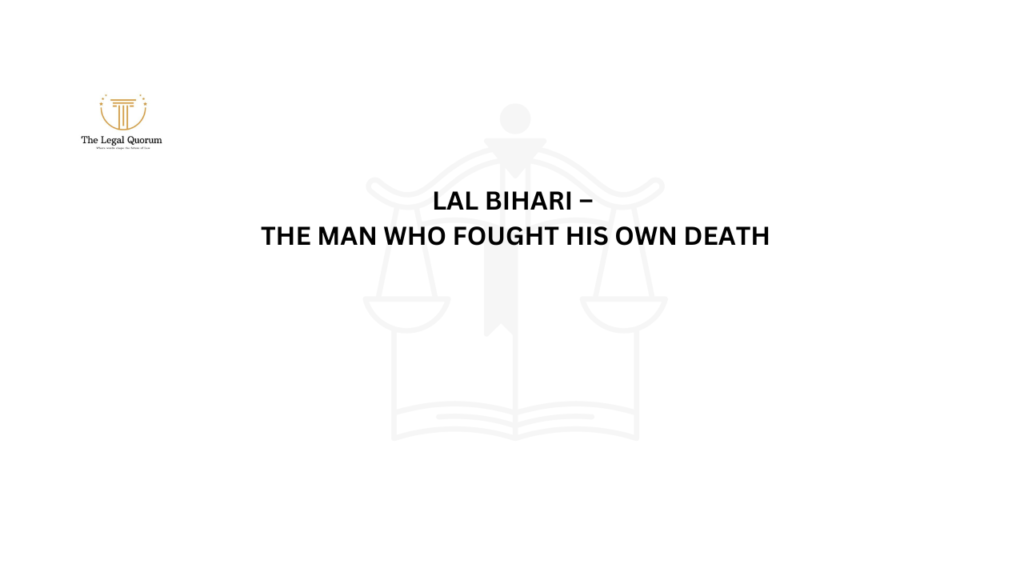Published on 24th August 2025
Authored By: Disha Choudhary
School of Law, Justice and Governance, Gautam Buddha University
Court: Supreme Court of India
Bench: Chief Justice Rajendra Babu & Justice G.P. Mathur
Date of Judgement: 26 May 2004
Relevant Provisions/Statutes:
- Indian Penal Code (IPC), Sections 375, 376, 376A to 376D
- IPC Section 377 (Unnatural Offences)
- IPC Section 354 (Assault or criminal force to a woman with intent to outrage her modesty)
- Article 14, 15(3), 21, and 32 of the Constitution of India
- Criminal Law (Amendment) Act, 1983
- United Nations Convention on the Rights of the Child (ratified by India in 1993)
- United Nations Convention on the Elimination of Discrimination Against Women (ratified by India in 1993)
Brief Facts
The petitioner, Sakshi, was a public interest organisation that advocates for women who are victims of sexual abuse and violence. The writ petition was made under Article 32 of the Constitution. The petition challenged the narrow interpretation of the words ‘sexual intercourse’ in Section 375 IPC – traditionally, understood to be only the penis/vagina penetration act. Sakshi argued that narrow definition of sexual intercourse excluded other penetrative acts such as, penis/oral, penis/anal, finger/vagina, finger/anal, and object/vagina penetrations from the range of penetrative acts that comprise the definition of rape in Section 375 IPC. The petitioner argued that acts of violation that were aggravated by perpetration on women and minor children at the time should be taken to be acts of rape as defined under Sections 375 and 376 IPC and should not be deemed as offences treated as less the offence under Sections 354 or 377 IPC.
The petition noted the authority’s failure to adequately register and prosecute these kinds of sexual violence as rape, so the victims had no protection and remedy, as the laws are written. The petition also referred to both constitutional violations caused by the narrow interpretation of the authorities under Articles 14 (right to be equal before the law), 15(3) (provision for special measures directed at women and children), and 21 (protection of life and personal liberty).
Issues
- Whether the words “sexual intercourse” in Section 375 IPC should be interpreted as ‘any penetration’ and not only limited to penile/vaginal, but other forms such as penile/oral, penile/anal, finger/vaginal, finger/anal and object/vaginal penetration.
- Whether all types of non-consensual penetration coverable under Section 375 IPC and not only limited to penile/vaginal penetration.
- Whether the narrow interpretation of ‘rape’ under Section 375/376 IPC (in particular) dilutes the protection available to women and children and is in contravention of Articles 14, 15(3), and 21 of the Constitution.
- Whether the classification of certain penetrative sexual abuses as offences under section 377 IPC (unnatural offences) or Section 354 IPC (outraging modesty) is safe, particularly in relation to children below 12 years.
- Whether the current interpretation defeats the legislative intent of the amendments in including Section 376(2) (f) (rape of girls below 12 years receives the strongest punishment) and all other amendments.
- Whether India’s obligations to its international commitments, (ratified and endorsed) tend to point towards broader meanings of ‘rape’, UN Conventions on the Rights of the Child, and UN Convention on the Elimination of all Forms of Discrimination Against Women.
Arguments
- Petitioner’s Arguments:
- The term “sexual intercourse” as described in Section 375 IPC is not defined and is subject to judicial interpretation. The explanation to Section 375 does not seem to limit penetration to merely scored/vaginal penetration.
- The restrictive interpretation of sexual intercourse excludes many forms of sexual violence directed against especially women and children, from being considered as rape, which must have severely limited protections for victims and effectively violated constitutional rights granted to them, Articles 14, 15(3) and 21.
- Sexual violence is an act of humiliation, degradation, and violation and does not consist merely of scored/vaginal penetration. Modern feminist legal theory supports a broader understanding of rape.
- The authorities treating non-scored/vaginal penetration as offenses under Section 354 or 377 IPC trivializes the trauma of the impact on the victims of the offense.
- Section 377 IPC was introduced to punish consensual or non-consensual “unnatural offenses” but should not be confused in its application to serious sexual violence against women and children.
- The objective of the Criminal Law (Amendment) Act, 1983, particularly in section 376(2)(f), demonstrates Parliament’s intent to provide protections for minor girls from all forms of sexual abuse.
- As a member of the international community, it is essential for India to comply with any strong commitment to a broad interpretation that is consistent with international obligations as a member of the world community with respect to sexual violence and protecting minors.
- Respondent’s Arguments:
- The definition of rape in section 375 IPC is specific to penile/vaginal penetration and does not extend to sexual assault in the form of non-penile/vaginal penetration, which is classified as unnatural offences under section 377 IPC.
- The scope of section 377 provides for serious punishment of a life term or sentence of up to 10 years, which is applicable for offences that do not include penile/vaginal penetration.
- Section 354 IPC punishes the offence of outraging the modesty of a woman and is therefore a much lesser offence that does not fall within the meaning of the offences defined in sections 375/376 or 377.
- The classification made by the authorities is lawful and consistent with legislative intent.
- Sexual abuse of children not involving penile penetration is unnatural and should be dealt with similarly to unnatural offences in section 377 IPC.
- There is ample protection and punishable offences against various forms of sexual assault conferred under the provisions of the Criminal Law (Amendment) Act of 1983, and further provisions.
- The petitioners’ interpretation would conflate the differences and distinctions between the various categories of sexual offences and expose itself to legal consequences unforeseen or unintended.
Judgement
In its ruling through Justice G.P. Mathur, the Supreme Court stressed the necessity of broadening the definition of “sexual intercourse” in Section 375 IPC. The Court determined that the narrow and constricted meaning of “intercourse,” limited to the erection and penetration of a penis into a vagina, was especially insufficient for many women’s (and children’s) experiences and understandings of sexual violence.
The Court also recognized that the Petitioners properly accounted for the trauma and violations related to penetrative sexual abuse under a variety of circumstances as they related to the definition of rape and agreed that the law must evolve from the current state to recognize and reflect the definitions in lived experiences and for international standards. The Court noted that this narrowing definition undermines the sexual integrity and sexual agency of victims and runs afoul of the vital guarantees for constitutional integrity.
In its ruling, the Court emphasized that Sections 375 and 376 IPC should be construed purposively and as including all manners of sexual non-consent and identity abuse and that “penetration” must include, as but not limited to, penile/oral, penile/anal, finger/vaginal, finger/anal, object/vaginal forms of penetration etc. The Court believed that this was consistent with the meaning behind legislation incorporating amendments to include Section 376(2)(f) and thus meet international obligations.
The Court also noted that to treat such violent sexual experiences as others outlined in Sections 354 or 377 IPC would detract from the seriousness of the situations, and such acts would diminish basic justice for the victims.
Ratio Decidendi
The main legal premise established is that the expression “sexual intercourse” used in Section 375 IPC should be given a broad meaning to include any form of penetration without consent, rather than limiting it to penile/vaginal penetration alone. This broad interpretation is needed to afford women and children with effective legal protection against all types of sexual violence while also guaranteeing their constitutional rights under Articles 14, 15(3), and 21 (life and personal liberty); India’s international commitments; and the rules of orientation of case law on sexual violence. Failure to read the written law on a broader basis that also includes forms of non-penile/vaginal penetration is unconstitutional and is contrary to the intent of the legislation, which aims to protect victims of sexual violence.
Obiter Dicta
The Court drew upon feminist legal theory and views on sexual violence globally. The Court stated that rape is not merely a physical act of penile/vaginal penetration. Rather, it is an inherent act of shame and degradation. The Court also emphasised the importance of purposive and teleological interpretation of criminal law legislation to remedy the effects of historic disadvantage that women and children have experienced relative to male gender privilege.
In addition, the Court recognised that the classification of sexual offences must consider the nature of the act on the victim rather than consider the insertion of penetration alone, and the Court perceived a victim-centred approach to interpreting and managing sexual violence.
Final Decision
The Supreme Court granted the declaratory relief sought by the petitioner by declaring “Sexual intercourse” in Section 375 IPC includes penetration of any kind, including Penile/oral; Penile/anal; Finger/vaginal; Finger/anal; Object/vaginal penetration. Consequently, offences that matter include the penetration as mentioned above, recording and charging under Sections 375, 376 and 375 IPC as Rape is more fitting than recording as a lesser offence under Sections 354 or 377 IPC.
Consequently, the court ordered the respondent authorities to record and investigate these offences, which provided sufficient legal protection and justice for victims of such offences.
This judgement is a significant movement in extending and developing the legal meaning of sexual violence in India and clarifying that legal definitions must progress with our current society and constitutional demands.
References
- Sakshi v Union of India (2004) Supp (2) SCR 723 (Supreme Court of India) https://indiankanoon.org/doc/1103956/ accessed 27 June 2025.
- POSH at Work, ‘Supreme Court’s Decision on Sakshi v Union of India’ (POSH at Work, 26 January 2004) https://poshatwork.com/supreme-courts-decision-on-sakshi-v-union-of-india/ accessed 27 June 2025.




